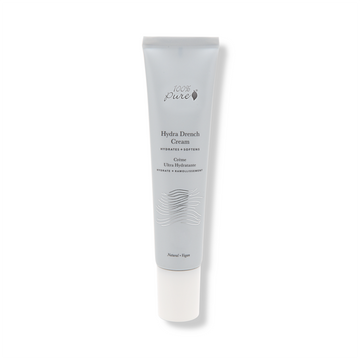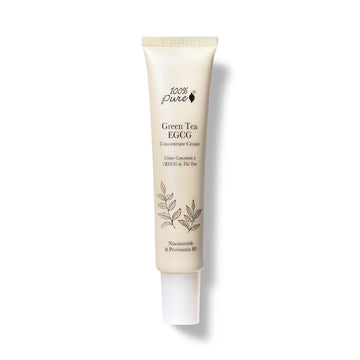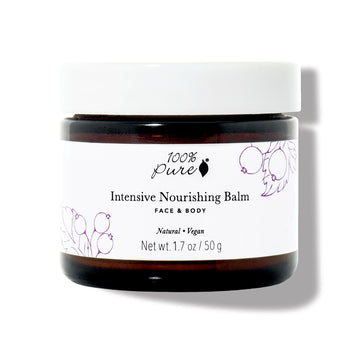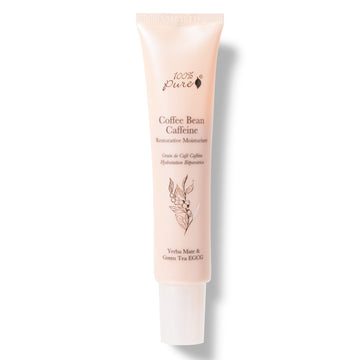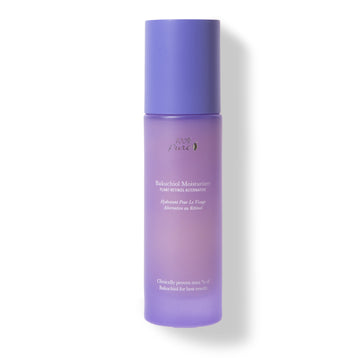Navigate the world of face moisturizers with confidence and ease
Written by: 100% PURE®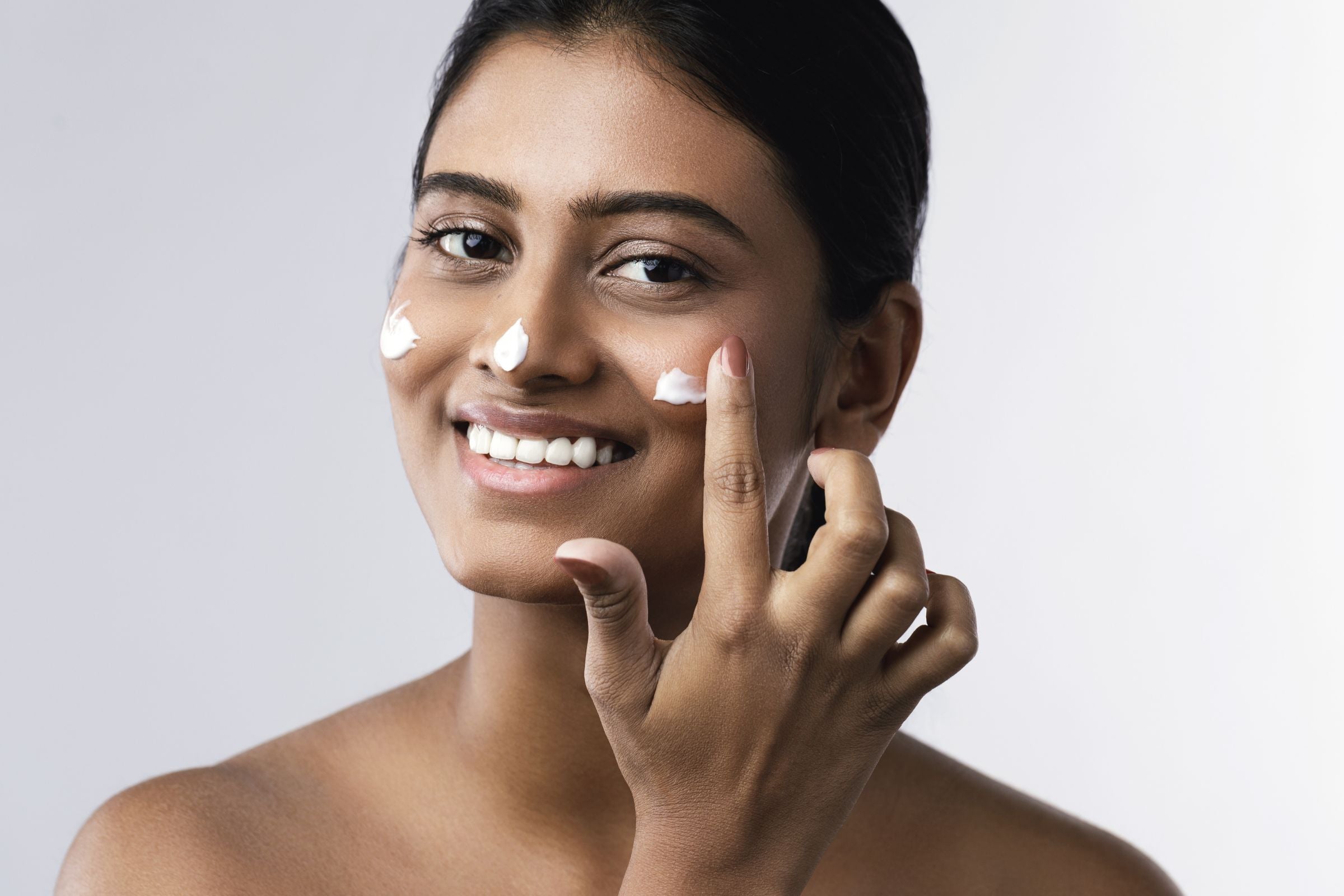
Skipping a moisturizer, no matter your skin type is a slippery slope. You wouldn’t turn down a glass of water on a hot day, right? The same goes for your skin – it gets thirsty, too! Frigid, frosty temperatures, like the Grinch, can rob your skin of protective moisture, while the sizzling summer months can ignite excess oil and clogged pores.
So, how can you find some skin-balancing on that slope? Enter a natural face moisturizer! Moisturizers like skis - have a range of motions, including hydrating the dry parts of your dermis and balancing the oily areas. Of course, nobody likes injuries, and that means skin-harming chemicals in our formula too!
Let’s glide over the benefits of natural face moisturizers, how to find the best one that suits your skin type and season, and fits a clean bill of health - plus the best moisturizers for maintaining a healthy, radiant complexion.
That feeling of catching air under your skis and sticking the landing or receiving a deep-tissue massage is like what your skin experiences when you give it moisturization. Both exhilarating and comforting, a face moisturizer offers a skin blanket of protection at keeping essential moisture and hydration in the skin and impurities and environmental aggressors out.
To understand the role of moisturizers, let’s just say that caring for the skin is part art – shout out to natural cosmetics – and part science – and that’s where a great, well-balanced skincare routine comes into play. Struggling to balance your skin can be a bit of a juggling act.
When temperatures are low or the air is dry, the weather zaps precious moisture away from our skin. This will exacerbate dryness for those with dry skin and cause sensitivities for those with finicky skin. When heat and humidity roll around, skin might grow oilier with slick skin types experiencing clogged pores and breakouts.
Every skin type needs some sort of moisture and hydration. Moisturizers are emollients, which means they absorb and lock in moisture and hydration. They’re designed to protect the skin’s barrier function and prevent moisture from leaving, and irritants or debris from entering. For dry skin types, moisturizers prevent water from evaporating from your skin, thus enabling skin to be plump, firm, and happy.
A natural face moisturizer is vital for oily skin, too. Skin-stripping products, pollution, and UV rays can damage your skin’s natural moisture barrier. As a result, your skin won’t be able to retain water and stay properly hydrated. To compensate, your skin begins to overproduce sebum, which can result in greasy skin, clogged pores, and acne.
Failing to add a natural face moisturizer to your skincare routine is usually one of the prime reasons your skin is dull, tight, or parched, overly slick with breakouts and even showing signs of premature aging. Let’s just say that a face moisturizer will lift you off the slopes and into the skin skies of balance, radiance, and peace.
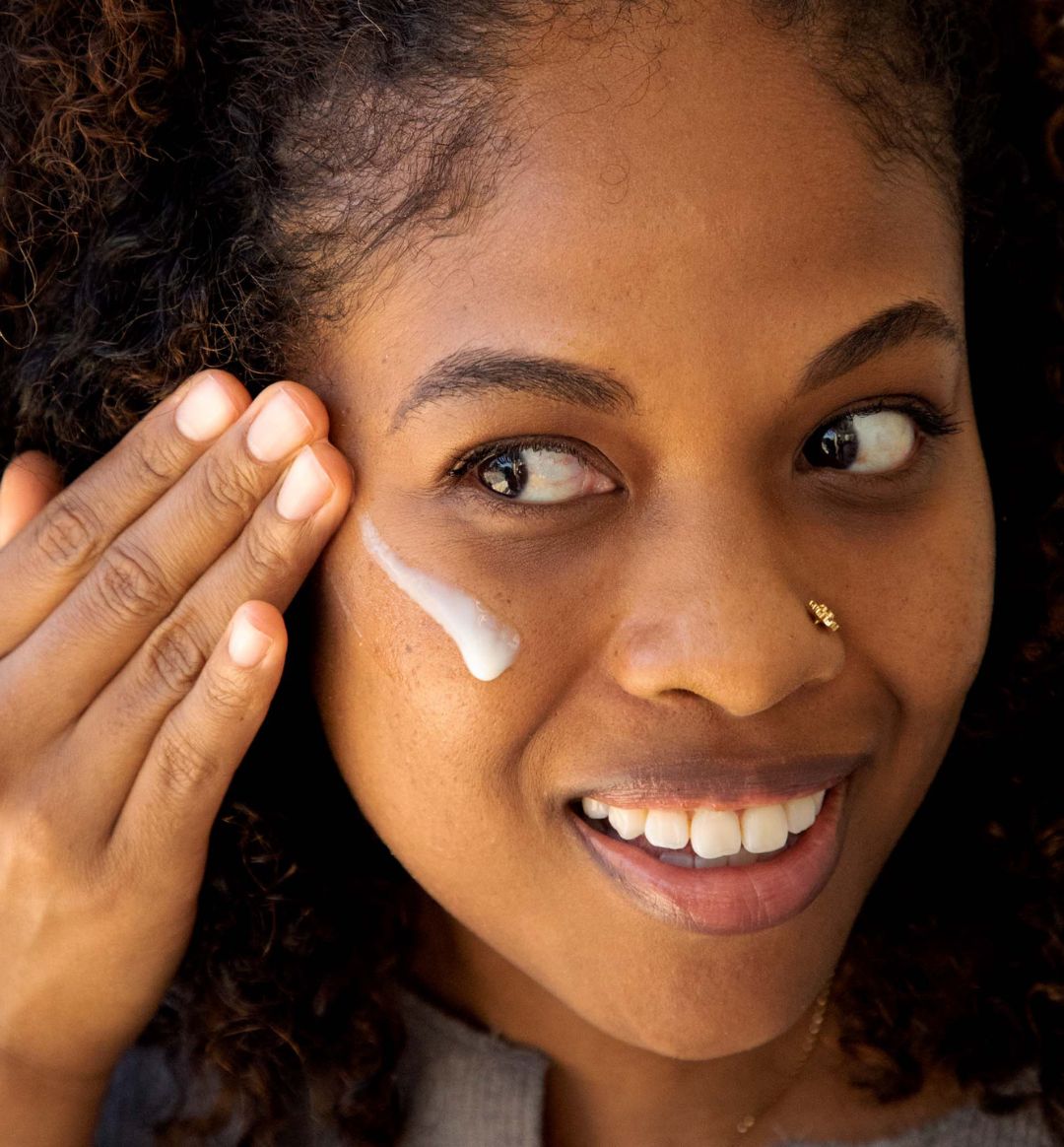
We know that our body is mostly made up of water, so naturally, our skin is primarily made of water makes sense. With that said, we need to be using a natural facial moisturizer that caters to the water-loving disposition of our skin and which type would play nicely with it. We have lotions, creams, balms, and gels; oh, my!
Lotions:
Contain more water and therefore have a lightweight, fluid-like texture. Many lotions still contain some oil, unless it’s a gel that specifically states it’s oil-free. Lotions sink into the skin quickly without leaving a film, making them an ideal option for daytime wear under makeup. They can also be nice in hot or humid climates when you may want or need less moisture.
Creams:
Contain a higher ratio of oil-based ingredients, which creates a thicker consistency that’s suitable for dry skin. Cream moisturizers have a thick and heavy texture, which creates a long-lasting protective barrier on your skin. The oil prevents the moisture from evaporating quickly and helps absorb the beneficial ingredients in the cream. Creams also tend to be a better choice in cold or dry climates where there’s less humidity in the air.
Balms:
Contain no water (anhydrous) and are therefore heavier in texture. Face balms are solidified oils that melt into liquid when they encounter the warmth of your skin. They provide a more robust and nourishing protective layer to your skin, sealing in your skincare for optimal results while shielding from external elements such as cold or dry air. Balms are known to be healing, calming, ultra-hydrating, and luxuriously thick, and are usually the final step in the skincare regimen.
Gels:
Contains a water base and is usually oil-free, which makes its texture watery and light. Gel moisturizers can hydrate your skin without clogging your pores. Because the texture is so airy and light, gel moisturizers can be applied before putting on makeup base and it won’t leave your foundation looking cakey. But due to its light texture, it evaporates quickly and you may need to apply it more frequently than the other moisturizers.
We always look for ingredients that absorb water, preserve the skin’s existing water and hydration, and draw more moisture into the skin as well. Here are the core ingredients to look for when shopping for the best natural moisturizer for your skin.
Humectants | We’ve talked about humectants before, but to give you the short and sweet version, humectants help to keep the skin hydrated by drawing additional moisture into the skin. The powerhouse humectants to look for in a great moisturizer formula would be popular picks, hyaluronic acid, well-known glycerin, and calming urea.
Occlusives | As the skincare industry evolves, the more awareness we develop around the ever-important moisture barrier. What we know is that it’s extremely instrumental for skin protection from the environment, moisture loss, and skin health. What’s great is that ceramides, butters, and wax-based ingredients are occlusives that help to do the barrier support heavy lifting in a moisturizer formula.
Emollients | These are like the crème filling in a sandwich cookie, bringing everything nicely together so it works. Emollients help stabilize the wet and waxy ingredients in a moisturizer formula to create not just the silky texture we’re looking for, but absorbability. We see the best benefits from ingredients like squalane and nut oils.
Essential Ingredients | There are a plethora of natural essential ingredients, actives, antioxidants, and vitamins added to face moisturizers depending on your skin type and concern. Some of these include:
Aloe Vera: Known for its soothing and hydrating properties, this super skin-soother is an excellent natural ingredient for calming irritated or inflamed skin or balancing oily skin and reducing acne breakouts.
Green Tea: Features EGCG, powerful free radical scavengers. It prevents oxidative damage while reducing premature aging. Its anti-inflammatory effects help soothe redness and irritation and its rich antioxidant content aids in maintaining the skin's natural barrier function and moisture retention.
Plant-Based Retinol: Gentle and plant-based alternative to retinol that is especially perfect for those with sensitive skin. Features many skin benefits like evening skin tone, hydrating skin stimulating cell turnover, and lessening the signs of aging.
Vitamin C: Increases collagen stimulation and cell turnover, which means brighter, firmer skin. It also protects against free-radical damage and premature aging, and it lessens dark spots, blemishes, and uneven skin tone.
Vitamin E: Moisturizes and strengthens the skin’s barrier, helping to alleviate dryness, redness, and flaking. It features anti-inflammatory benefits, which can help with symptoms associated with eczema and psoriasis. It’s also popular as a treatment for minimizing the appearance of stretch marks and scars.
Rosehip Seed Oil: Rich in vitamins and omega fatty acids that deeply hydrate and replenish thirsty skin. This cold-pressed oil offers maximum potency to effectively target fine lines, loss of elasticity, and uneven skin tone.
One of the most pivotal and influential products in skincare is moisturizer, and when on the hunt for the best natural moisturizer for your skin, it’s important to consider a few factors, such as skin type and which formula would play nicely with it.
Primary skin types include dry, combination, oily, normal or neutral, and sensitive; with sensitive being an additional signifier that we see most commonly with dry skin, but can manifest with any skin type. For oily and combination skin types, we often will see a presence of oil on the skin’s surface, even shortly after the face has been washed. Conversely, dry skin types often feel tightness and discomfort on the skin, sometimes with the addition of flakiness and rough patches.
What’s interesting is that in some cases, dry and oily skin types have something critical in common. Both dry and oily skin types can be suffering from improper skin hydration. Though it shows up differently, a sense of dryness or persistent oiliness can be a sign that the skin isn’t getting the hydration or moisturizer that it needs.
Luckily, it’s a problem with a relatively easy fix. Let’s talk about other signs that our skincare routine may need tweaks, and what to look for in the best natural moisturizers for skin.
Newsletter Subscribe
for more blog updates and exclusive discounts
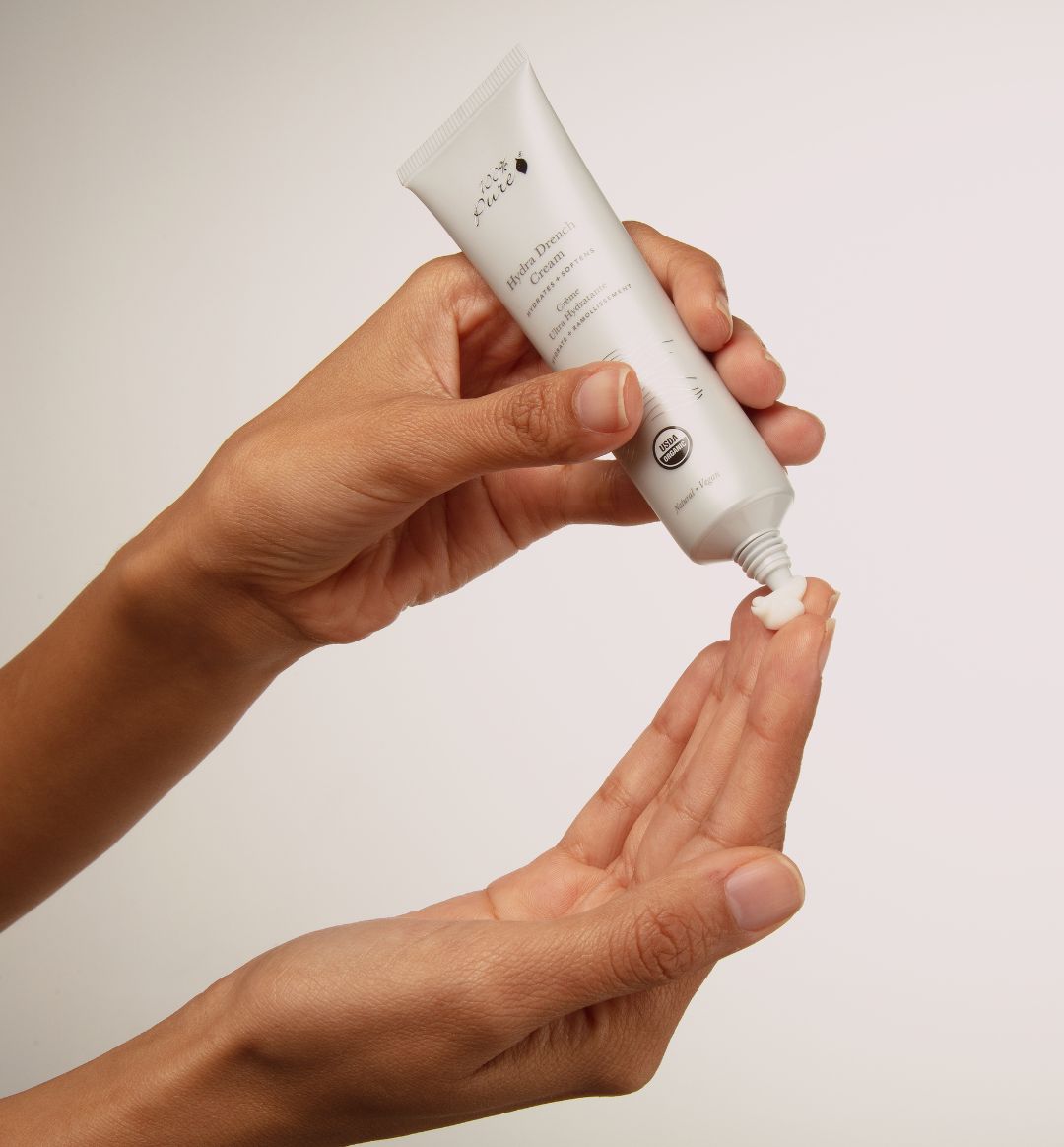
So, what’s the best face moisturizer to try, when the options seem endless? Every skin type needs varying amounts of both hydration and moisture – but how do you figure out which moisturizer will fit your needs? We’ve whipped up a day or night, dry or oily, complete breakdown for choosing the right natural face moisturizer for you. Time to lock in your personalized moisturizing routine!
Natural Skin Care For: DRY SKIN
Common Dry Skin Symptoms:
- Itchiness
- Irritation
- Tight, taut skin
- Makeup ‘catches’ on dry spots or flakes off
- Increased itchiness and irritation while wearing makeup
- Makeup flakes off
Hydra Drench Cream
Texture Profile: Lightweight gel-lotion
SKIN TYPES: Normal, dry, sensitive
Key Ingredients: Chia Seed Gel, Rose Water, Sodium PCA
When to Use It: Day & Night
This daily moisturizer is great for normal skin types who want extra hydration, without a heavy dose of moisture from oils. Sensitive skin types will also love this formula, because of its lightweight and soothing ingredients. Dry skin types can benefit from the powerhouse levels of hydration found in Hydra Drench but may need to layer an additional moisturizer for more moisture (oil).
The base of chia seed gel gives this gel-lotion formula an extra light feel on the skin while doubling down on suppleness from omega fatty acids. Rose water is famously friendly to sensitive and dry skin types and can soothe redness or irritation with its light floral essence.
Sodium PCA is much like hyaluronic acid (another ingredient in this hydrating formula), in that it helps attract hydration into the skin. But while hyaluronic acid delivers giant doses of water to the skin through tiny molecules, sodium PCA draws moisture from the air into the skin. Now that’s what we call working smarter, not harder!
Natural Skin Care For: OILY SKIN
Common Oily Skin Symptoms:
- Increased likelihood of blackheads due to buildup
- Increased likelihood of acne due to buildup
- Excess oil ‘catches’ dirt and environmental debris
- Excess shine on forehead, nose, chin
- Makeup slides off, clusters, or smears throughout the day
- Eye makeup creases and smudges more easily
Green Tea EGCG Concentrate Cream
Texture Profile: Medium-weight cream
SKIN TYPES: Normal, oily, combo, aging, acne-prone
Key Ingredients: Yerba Mate Water, Green Tea EGCG, Olive Squalane
When to Use It: Day & Night
Green tea is one of the most protective ingredients in the skincare game. Adding it to a moisturizer means anti-aging benefits, defense against environmental damage, and multitasking nutrition for your skin. This natural face moisturizer is medium weight, with a non-greasy feel and fast-absorbing formula. The caffeine content from yerba mate water and green tea makes it great for controlling excess oil, soothing redness, and boosting circulation in tired, puffy skin.
If a multitasking, protective moisturizer is what you’re looking for, EGCG (the key phytonutrient in green tea) is right up your alley. Using this powerful antioxidant in your daily moisturizer can help your skin fight UV damage, and neutralize free radicals, pollution, and airborne toxins. Olive squalane delivers skin-softening moisture, without feeling heavy or greasy.
Natural Skin Care For: SENSITIVE SKIN
Common Sensitive Skin Symptoms:
- Skin is easily irritated by certain ingredients
- Increased likelihood of redness, inflammation, and rashes
- Itching or burning sensations may occur when using the wrong product
- Often uses the same products for years without changing, even if ingredients are unsafe for skin
- Less likely to wear more products for fear of triggering adverse skin reactions
Intensive Nourishing Balm
Texture Profile: Solid balm; melts on contact
SKIN TYPES: Sensitive, dry, combo, aging
Key Ingredients: Avocado Butter, Shea Butter, Rosehip Seed Oil
When to Use It: Day & Night
Looking for an intensely moisturizing balm that offers maximum nourishing, smoothing, and anti-aging benefits? This decadent, moisture treatment can – and much more! Use this as a spot moisturizer for the face for combo skin types, targeting areas of extreme dryness or flaking.
Healing avocado, shea butter, and almond oil restore softness and elasticity for more supple skin. A myriad of anti-aging vitamins and antioxidants work hard to protect and repair dry or damaged skin. Use this as a spot moisturizer for the face, targeting areas of extreme dryness or flaking. It can also be used on rough patches on hands,
PRO TIP: Got sensitive skin? Always remember to patch-test before using new skincare!
Natural Skin Care For: COMBO SKIN
Common Combo Skin Symptoms:
- Oily areas
- Dry or patchy areas
- Sun damage, like dark spots, age spots
- Makeup ‘catches’ on dry spots or flakes off
Coffee Bean Face Cream
Texture Profile: Medium-weight cream
SKIN TYPES: Combo, normal, oily, aging, acne-prone
Key Ingredients: Coffee Extract, EGCG, Aloe, Yerba Mate
When to Use It: Day & Night
Numerous studies are touting the benefits of actually drinking a cup of coffee, but did you know that this go-go juice is also amazing for your skin? When applied topically, the caffeine in coffee can help to mitigate some of the effects of inflammation--such as puffiness and redness. A natural concealer can temporarily hide dark circles or puffy eyes, but a natural, coffee-based skin care product can target the root cause of the problem, making a more meaningful difference for your skin.
Our beloved 100% Pure Coffee Bean Caffeine Eye Cream fans demanded its facial moisturizer counterpart and we delivered. While the eye cream focuses on addressing dark circles and reducing puffiness, the benefits of caffeine for your skin in this moisturizer are threefold: 1) Firming, 2) Illuminating - through enhanced circulation, which brings about a natural brightness to the skin like the glow after physical activity, and 3) Restorative - caffeine aids in rejuvenating sun-damaged skin while providing protective properties.
Natural Skin Care For: ALL SKIN TYPES, AGING
Common Aging Skin Symptoms:
- Signs of premature aging
- Dry, dull areas
- Sun damage, like dark spots, age spots
- Aging concerns, like fine lines and wrinkles
- Collagen depletion, loss of elasticity
Bakuchiol Moisturizer
Texture Profile: Light to Medium-weight cream
SKIN TYPES: All skin types, aging
Key Ingredients: Bakuchiol, hyaluronic acid, niacinamide, kojic acid
When to Use It: Day & Night
Anyone who wanted to use retinol but can’t due to sensitive skin can now get their hands on a better substitute. There are a few ingredients in skincare that are golden.
Bakuchiol is like the mythical fountain of youth for your skin. This anti-aging superstar offers a gentle and plant-based alternative to retinol that is especially perfect for those with sensitive skin – and it’s safe for all skin types.
This antioxidant-rich, natural retinol moisturizer packs a gentle but powerful punch to soften and hydrate the skin. Formulated with deeply hydrating hyaluronic acid and squalane, this powerful botanical stimulates cellular turnover, boosts collagen production, and lightens age and sun spots, while lessening the appearance of lines and wrinkles.
How often should I apply a moisturizer?
As a general guideline, it is recommended to use a natural face moisturizer twice a day. In the morning, moisturizing helps to hydrate and protect your skin throughout the day, creating a smooth canvas for makeup application. In the evening, moisturizing provides nourishment and replenishment to the skin while it repairs and regenerates during sleep.
Can I use the same moisturizer for day and night?
To keep things simple, it may be best to think about it this way: Your daytime moisturizer should be focused on protection, and that means it should contain SPF! Your nighttime routine should be focused on repair. Ultimately, you should use a night cream that's specifically formulated to nourish and repair your skin while you sleep.
What if my skin reacts negatively to a moisturizer?
If a moisturizer is not suitable for your skin type, it can clog pores and cause breakouts. This is especially true for people with acne-prone or sensitive skin. It's crucial to choose non-comedogenic products that won't clog pores and to patch-test new products to see how your skin reacts. A natural moisturizer for your skin type and needs is the way to go to avoid potential reactivity to synthetic chemicals and irritants often found in conventional face moisturizers.
Can I mix different moisturizers?
Yes, it is generally safe to mix natural face moisturizers with other natural options. But with synthetic moisturizers, it’s important to consider the compatibility of the ingredients and the potential interactions they may have as conventional formulas often have harsh ingredients that can cause a reaction on your skin.
It's always recommended to perform a patch test on a small area of skin before combining products to ensure no adverse reactions. If you have any concerns or uncertainties, consult with a skincare professional or dermatologist for personalized advice.
Do I need to change my moisturizer with the seasons or as I age?
Most often, people's skin will become drier as they age, so even if the skincare system made for "oily" or "normal" skin has worked your whole life, you will probably have to switch out your products over the years to address your specific skincare type and concerns. On that note, don't forget that skincare products expire, too.
The power of nature in skincare lies in the gentle yet effective properties of natural ingredients that nourish, protect, and rejuvenate the skin. From soothing aloe vera to regenerative rosehip seed oil and antioxidant-rich green tea extract, natural ingredients provide a holistic approach to skincare and a blanket of protection for the skin of your dreams.
It is essential to build a consistent natural skincare routine tailored to your skin type and concerns. By choosing a regular moisturizing routine, you can harness the potency of nature to address specific skin conditions such as acne or dry, dull skin. A natural face moisturizer works synergistically with your skin, delivering nourishment and promoting balance for a healthier complexion.
Remember, when it comes to natural skincare, consistency is key. Regularly using the right face moisturizer allows your skin to experience its full benefits over time. Embrace the power of nature, nurture your skin with natural ingredients, and enjoy the transformative effects of a natural face moisturizer knowing that you have the right one with confidence and ease!
- Tags: August-2023, Skin Care, skincare
We carefully hand-select products based on strict purity standards, and only recommend products we feel meet this criteria. 100% PURE™ may earn a small commission for products purchased through affiliate links.
The information in this article is for educational use, and not intended to substitute professional medical advice, diagnosis, or treatment and should not be used as such.



